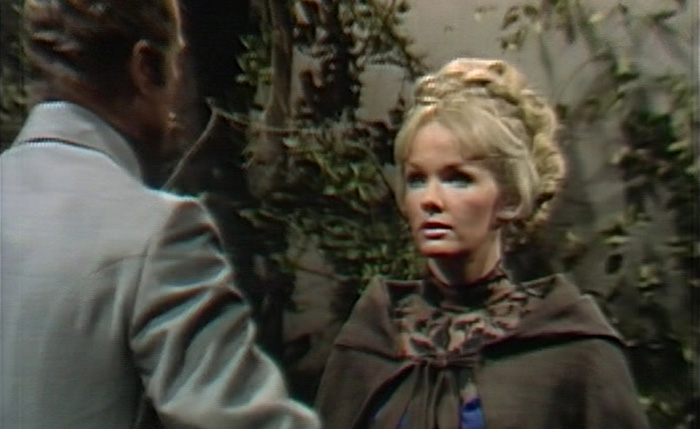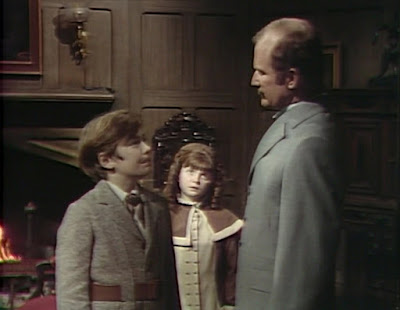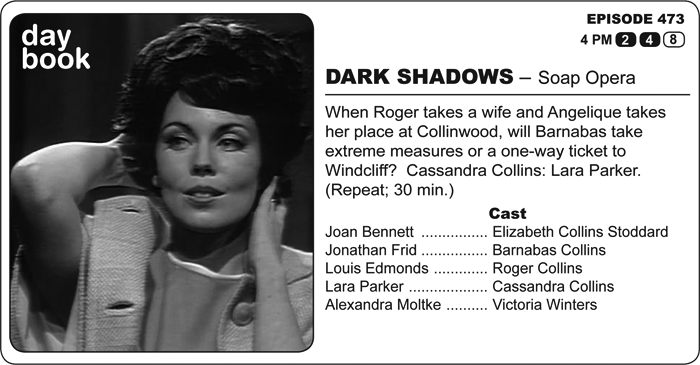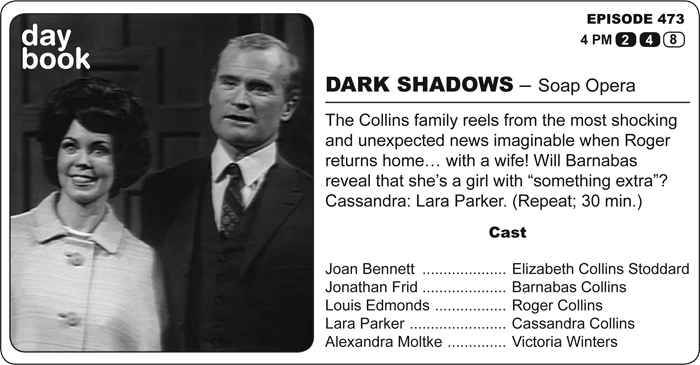
By PATRICK McCRAY
Taped on this date in 1969: Episode 730
As Quentin descends with Jamison into the world of occult chicanery, Edward learns that the past can be a real mother! Laura Collins: Diana Millay. (Repeat; 30 min.)
As Quentin uses occult influence to prevent Gregory Trask from taking Jamison, Laura uses Nora to insinuate herself into the house. This disrupts plans both good and bad, and Edward is stunned and incensed at her return.
Laura arrives in a brazen move by the show, shouting back to the primary supernatural threat from the show prior to Barnabas… which means prior to most viewership. Diana Millay gives a shockingly relaxed, modern performance as the returning Laura. She brims with confidence as a character and as an actor. Arriving at the worst and best time, Laura’s proto-reemergence is classic 1897. The story arc is the show’s first shot at Dickens, and nothing screams Dickens like terrible timing. (Ask any high school student with an essay due on Bleak House.) Children, about to be sent off to an unthinkably cruel boarding school, meet their long-missing mother in the nick of time. But does she offer a more diabolical form of escape?
 No wonder the record and sky high ratings were reserved for this storyline. If the 1795 storyline were written for housewives, allowing them to be Vicki (out of place and glamorously persecuted), Josette (except no one else sees it, the blind fools), and Angelique (and hear her roar), this was aimed more at the demographic running home from school. It’s written for kids in front of the tv, and it’s talking about weird parental dynamics openly and from their point of view. This kind of depiction of liberal parent vs. stern appeals to any child with a disciplinarian in the roost… or who wishes there were someone who cared enough to be one. It provides fantasties across that spectrum. And it really layers the truths because it’s not black and white. Yes, we know that Edward is ultimately on the right end of the spectrum. He just has no idea what’s really going on at Worthington Hall. Quentin is also on the right end of the spectrum. Yes, the man wants what’s best for Jamison. He just can’t overcome the fact that he’s the uncle who educates before he schools, and while this is fun, it’s not sustainable. And then there’s Laura. Who’s all about love and fire.
No wonder the record and sky high ratings were reserved for this storyline. If the 1795 storyline were written for housewives, allowing them to be Vicki (out of place and glamorously persecuted), Josette (except no one else sees it, the blind fools), and Angelique (and hear her roar), this was aimed more at the demographic running home from school. It’s written for kids in front of the tv, and it’s talking about weird parental dynamics openly and from their point of view. This kind of depiction of liberal parent vs. stern appeals to any child with a disciplinarian in the roost… or who wishes there were someone who cared enough to be one. It provides fantasties across that spectrum. And it really layers the truths because it’s not black and white. Yes, we know that Edward is ultimately on the right end of the spectrum. He just has no idea what’s really going on at Worthington Hall. Quentin is also on the right end of the spectrum. Yes, the man wants what’s best for Jamison. He just can’t overcome the fact that he’s the uncle who educates before he schools, and while this is fun, it’s not sustainable. And then there’s Laura. Who’s all about love and fire.To what degree does Laura actually care for the kids (she did abandon them, after all) and to what degree is she trying to satisfy an evil fire god? Yes! I don’t think they are mutually exclusive for her. And the kids (on the show and as viewers) get a little of everything. Laura is about indulgent passion for her kids. Quentin is about indulgent fun. Edward indulges with structure. He actually cares more than either of the others,because it’s more than a convenience, and yet he lacks the tools to demonstrate it in any way that Jamison and Nora can appreciate.
The clever thing in the episode is how Louis Edmonds’ performance shows that dichotomy. When Nora is terrified of the face in the fireplace, Edward is determined to erase that fear. He attempts it terribly, but he tries. The show then takes us to the conversations that the children don’t see, yet concern them. Say what you will about Edward, but he puts his full passion into raising the children. He stayed at his post when the trainees -- Quentin and Laura -- ran (off to Alexandria). That’s why Quentin only snipes at him.
With 724, Dark Shadows becomes an increasingly masculine show, and I don’t mean that in some two-fisted, brutal, five o’clock shadow-sporting, Bud-swilling, Rowdy Roddy McDowell sense. Yes, men cause a lot of the problems on the show, but often as dupes and doofi and people who think with more romance than reason. But they often have soulful vulnerabilities or elements of amusing self-contradiction that add a puckish dimension to the depiction of men. Only in people like Gregory Trask and John Yaeger do we see purely lustful evil after this point.
And some of this is by contrast. A year ago, Vicki and Carolyn and Julia were all wringing their hands about the Life and Death of Peter Bradford, and, well, okay. Vicki had just returned to see a man torn apart like a dog toy in the jaws of two jealous and competing females. Our hero was powerless in Angelique’s shadow. It was still Vicki’s show, and we all just live in it. But with her story vaguely resolved, it belongs to Jonathan Frid. The beautiful thing about both Frid and Barnabas is that they don’t seem to want it. There’s no preening and scene stealing. Just as Barnabas serves the family, Frid seems to serve the show.
In the service of THIS episode, we have to recognize the entire ensemble. David Henesy is the respectable skeptic not predisposed to believe Nora’s ravings about their returned mother. David Selby effortlessly sells the rapport with Jamison that demonstrates why the later haunting will be inevitable. Diana Millay is the ultimate Weekend Mom, and a believable one. And then, there’s Louis Edmonds.
Good gravy, talk about service to the show. There is no such thing as a wasted Louis Edmonds scene, and that’s never been truer than with Edward Collins. Roger may have the most of his episodes. Joshua has the most mythic importance. PT has those fabulous scarves. Brutus is named “Brutus” and sports a pointy beard, which is its own reward. But Edward Collins is his most prized creation as an actor. Relentlessly stiff, yet never predictable, he’s the spirit of late-Victorian zest and progress. Hilariously so. In this episode, he says both “chicanery” and “humbug,” so there you go. I was so excited, I contacted Wallace, who lamented that balloons didn’t drop from the ceiling. Edward is the prime Victorian male archetype, which is a polite way of saying, “well-written stereotype.” At the same time, he always has the capacity for surprise. When Edward reveals or discovers a new layer of himself, such as when he becomes Edward Collins: Vampire Slayer, I have no choice but to buy it because Edmonds completely justifies whatever the writers cook up. And just wait for the transformation Count Petofi unleashes! Edward’s inner life of meek subservience says everything about Edward’s almost fetishistic adherence to obligation, social codes, and the safety of a rigid limit of options. The man has more structure than a Stephen Sondheim song. And he’s every bit as witty and refreshing. Just watch the fun Edmonds has and you, too, will start giggling in precisely the manner that would merit a severe upbraiding from Edward. Perhaps a strong reprimand. A searing indictment is not out of the question. There’s a likelihood of a thorough caning from an experienced hand. And, inevitably, a healthful diet rich in salubrious roughage.
Hail roughage! Hail Edward Collins, its high priest!
And, whatever you do, be grateful for Louis Godbless’em Edmonds!
This episode hit the airwaves April 11, 1969.


